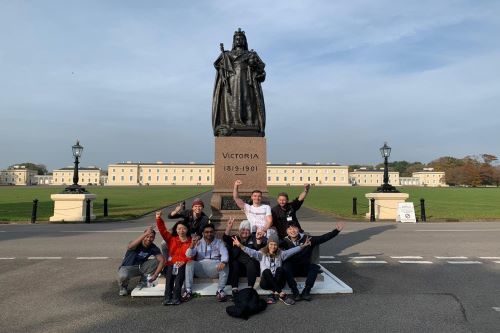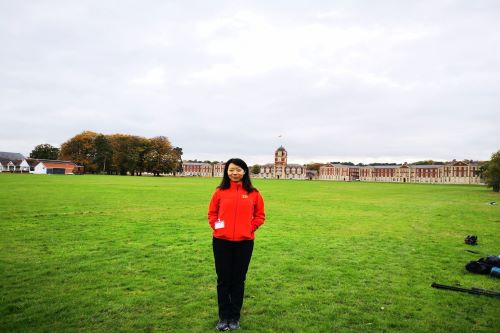My Full-Time MBA journey at Cass
Building a bridge to my future career
An MBA programme is like a bridge that connects yourself from yesterday to your future self. Crossing this bridge is a journey. You unearth your skills of detecting problems and delivering compatible solutions by learning and practising mechanisms, methodologies and frameworks. The ingeniously designed campus life at Cass and studying on the Cass Full-time MBA, ranked top one-year programme in London by the Financial Times Global MBA rankings in 2020, have helped me build this bridge.
To define the trip, I would like to break it into three categories, being described by the triple ‘re’: rediscover yourself, reshape your thinking and mindset and revitalise your transferable skills. The triple ‘re’ happens coherently and cohesively throughout the programme.
Rediscover yourself
Our magical journey started with a careers orientation week. Self-awareness is one of the most popular words from then on. Truly knowing yourself is easier said than done.
We immersed ourselves into designed activities, including taking personality tests to know our strengths, following instructions to list life goals in time slots, reviewing personal profiles to examine previous performances, attending learning workshops to find out where we may have weaknesses and talked with the Careers and Professional Development Team.
Following all these activities, I got to know what the starting point was in my bridge and what my next steps needed to be to link the two points on this bridge.

Reshape your thinking and your mindset
As a group of people who had achieved professional successes, we do not lack basic competences. What we are looking for is to become even more competent and to bring our skills from good to great.
What we share in common is our desire to develop a keen eye to see the core causes of work-related issues, to discover the logical structure to analyse problems and to develop our creative thinking to come up with solutions. All these things are already skills we have developed on the programme.
In class, the core modules of the programme have taught us more than technical knowledge. Through numerous case studies and discussions, we learned how to decipher the main clue from an abundance of information, how to draw a whole picture of the situation strategically, build up an independent analysis system and how to create a personal toolkit to solve problems.
Out of class, the two and half days of professional development teach us how to handle the relationship between an individual and a group. We investigated leadership and groupwork models, such as the leadership/followership model, role-modelling, contribution and regular debriefing.
We learned how to find appropriate solutions under strange circumstances by learning about how to choose a correct direction, the best way of doing an appraisal of task, and looking into creative trails, agile progress and independent thinking.
When it comes to soft skills, we learned more about how a good spirits and trust in a team can help individuals and groups under pressure: it is important to remain calm, build trust, collaborate, remain open-minded and to build resilience.
Revitalise your transferable skills
Practise, practise, practise! Teamwork, exams, integration week, strategic projects, international consultancy week and various events provide loads of opportunities for us to test what we have learned.
Studying and working together with a cohort of 30 nationalities is exciting and memorable. Getting convergencies within a multicultural group needs mutual understanding, smart influencing and persuading and thorough communication. Critical analysis is the underlying skill tested by exams.
Working very hard for four days to solve a mixed problem with lovely group of members from day to night was an excellent and interesting experience. Swiftly understanding the core question, making up a logical structure and defining efficient actions for each person are major factors for success.
The two consulting projects we undertook with real companies were amazing experiences that allowed us to use all of the knowledge and skills we have gained throughout the Full-time MBA, particularly the ability to dig out the strategic problem and use a top-down method to delegate the problem mutually, exclusively, collectively and exhaustively.
I have also found that attending events is the best way to network and learn fresh ideas from talented people.
A special episode of the trip
When the MBA programme is disrupted by an unprecedented event such as Covid-19, what can we do? There are multiple choices and using the triple ‘Re’ is one option I suggest. Analysing the situation objectively and strategically by using tools learned from lectures made me keep independent thinking.
Our “Achieving Your Potential” week at the Sandhurst Military Academy, which was a key part of our professional development training, reminded me how to make myself become calm, peaceful, positive and resilient under pressure. The week gave me extra energy and taught me how to encourage and console my cohort.
Today, we are learning to exercise our leadership skills during group assignment remotely. I found more extensive engagement, trust and positive spirits in my group, which we have used as pillars to maintain collaboration when face-to-face meetings were replaced by virtual ones. Our great effort in adapting to a challenging time and new ways of working meant my team was awarded a distinction as part of a recent team group project.
I would also like to extend my thanks to the School. The dedication, support and collaboration of the staff has helped us continue studying the programme in these unprecedented times and has also taught us how to cope with unexpected global crises.
As I reflect on what I hope to be the next point of my bridge, I hope to be a person who has strong insight into the essence of things in this changeable world. My MBA journey is leading me to that point. Covid-19 can disrupt our physical distance temporarily but cannot disrupt the pursuit of our dreams.
